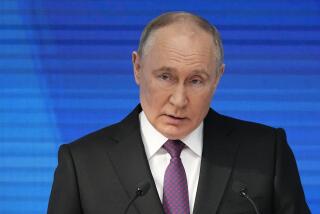Soviet Conservative Warns of Potential for Civil War : Baltics: He says recent violence could lead to an army coup, bringing ‘horrible chaos and complete anarchy.’
- Share via
MOSCOW — The leader of the major conservative faction in the Soviet legislature said the recent violent events in the Baltic republics will likely lead to civil war, the country’s biggest newspaper reported Sunday.
Col. Viktor Alksnis, the head of Soyuz, or Union, said the Soviet army could split or stop obeying the Kremlin and take power by force unless President Mikhail S. Gorbachev cracks down on the rebellious republics.
“I do not exclude that the army will become autonomous,” Alksnis said when asked if the army could seize control of the country at bayonet point.
The civil war would pit Communists against radicals, Alksnis said, and would not be restricted to the Baltics.
“It will inevitably escalate into a civil war on the scale of the (Soviet) Union,” he told the progressive weekly newspaper Argumenty I Fakty, which has a circulation of 24 million. “The result will be horrible chaos and complete anarchy.”
The influential right-wing faction that Alksnis leads claims the support of more than a fifth of the 2,250-seat Congress of People’s Deputies, the national parliament. Late last year, Soyuz threated to demand Gorbachev’s resignation if he failed to take resolute steps to stabilize the country’s political and economic situation, but it later said it was satisfied with Gorbachev’s response.
Soviet politicians, ranging from radicals to the most conservative and including top government officials, speak often of the danger of civil war if the country’s political, economic and ethnic crises are not resolved quickly. There have been detailed press reports of military plans for a coup.
But, so far, “civil war” remains a political metaphor for the great chaos that ordinary people fear may be coming.
In the interview with Argumenty I Fakty, Alksnis also accused Gorbachev of approving establishment of the National Salvation committees that attempted coups against the elected nationalist governments in the Baltic republics of Latvia and Lithuania earlier this month, then turning his back on them when the actions failed.
According to Alksnis, the committees were told Gorbachev would take advantage of the conflict to implement direct presidential rule of the rebellious Baltic republics, but that plan was evidently abandoned after 20 people were killed in operations of Soviet troops in Latvia and Lithuania.
“The president betrayed us,” Alksnis said. “He is afraid to take responsibility himself.”
“Imagine a surgeon starting an operation, making an incision in the body of a patient and then leaving him,” he said in an apparent reference to Gorbachev.
Editors of Argumenty I Fakty, in an introduction to the Alksnis interview, said they “did not have the right not to publish the interview” and emphasized the gravity of his assertions, even if just partially true.
Alksnis said the military was angered when it was made the “scapegoat” for the violence in Vilnius, the Lithuanian capital, and Riga, the Latvian capital.
Although Gorbachev still leads the armed forces, Alksnis said, this treatment could force the army to stop heeding the president’s orders.
In the course of a civil war, a “new power” would likely emerge, he continued. “It will not be (Russian Republican President Boris N.) Yeltsin, not Gorbachev, but a completely unknown person who in the current situation may by chance come to power,” he said.
The interview with Alksnis was published just after the Soviet leadership announced two new measures that give Soviet forces new more visible roles in fighting economic sabotage and crime.
Gorbachev on Saturday empowered the KGB security agency and the Interior Ministry to enter any premises in the country other than foreign embassies to search for evidence of economic crimes. The president’s decree gives KGB agents and police the right to take any documents from domestic or foreign businesses that they might need for investigation.
The defense and interior ministries also announced plans to use soldiers to help police patrol all major cities starting on Friday.
More to Read
Sign up for Essential California
The most important California stories and recommendations in your inbox every morning.
You may occasionally receive promotional content from the Los Angeles Times.













